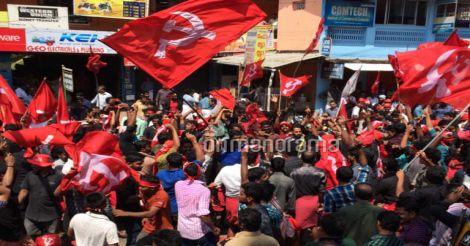In the nineteen fifties and sixties the most important issues that the people of Kerala were grappling with were glaring inequality and exploitation.
Ownership of land was concentrated in the hands of a few people. Most of these were absentee landlords who rented out parcels of land owned by them to farmers, who undertook cultivation using hired laborers.
These laborers were mostly landless lower caste Hindus, poor Christians or Muslims.
They did not own even their homestead lands. Some of them were Dalits, who were victims of the Kerala version of slavery that used to exist in the pre-independence days.
These landless laborers were exploited and often physically abused by the rich landowning class.
Though some religious leaders and social activists did fight for the rights of the oppressed landless people, religious leadership, Hindu, Christian and Muslim, was mostly in the hands of the landowning class.
This was the socio economic milieu in which communist movement took roots in Kerala. Similar socio economic conditions prevailed almost everywhere in India at the dawn of Independence, but communist movement took deep roots only in Kerala and West Bengal because of greater literacy and prevalence of social activism inspired by Western values.
Though leaders of the Christian community in Kerala mostly belonged to the landowning class, propagation of the message of human dignity through Christian educational institutions created a conducive atmosphere for the spread of egalitarianism.
Revolutionary transformation of Malayalam literature and popular art forms prompted by the exposure to modern literature of Western languages brought greater popularity to literature and made it a powerful instrument of social change.
The emergence of a whole array of modern fiction writers of outstanding merit like Thakazhy, S.K. Pottekat, P.C. Kuttikrishnan (Uroob),Vaikom Muhammed Bashir, Ponkunnam Varkey, Keshav Dev et al and critics and essayists like M.P. Paul and Joseph Mundassery brought Malayalam literature closer to the people.
This and the musical dramas pioneered by Thoppil Bhasi and KPAC and other art forms dealing with the problems of common man’s life contributed very significantly to the change of Keralite mindset from feudal to modern.
This cultural revolution along with people’s mobilization by an ideologically committed group of communist leaders led to an awakening of social consciousness and assertion of rights by the hitherto oppressed sections of society.
The cumulative impact of this societal transformation led to the emergence of communism and leftist thinking as a powerful force in Kerala’s politics and intellectual life.
Leftist influence would appear all pervasive in Kerala’s cultural scene today and leftist ideas have dictated the political and cultural discourse in Kerala for more than six decades now.
Cultural leaders have come to realize that their progression depends on identification with leftist thinking.
It requires tremendous courage of conviction to stand up for contrarian views and face the wrath of leftist intellectuals.
Yet, the leftist agenda too has changed over the years in Kerala. With the passage of time all political parties have come to a tacit understanding with the traditional leadership of various religions and have also adopted an unhealthy policy of coexistence even in the field of education.
The pattern of economic development including the process of amassing wealth has changed. The families that figured in the list of the richest in the nineteen fifties have been replaced by names that were unheard of then.
Landed gentry have been replaced by business tycoons in the list of the most influential. Politics, education and real estate are the biggest money spinners now.
Nobody really believes in ethical values except as a convenient argument in political debates.
While honesty continues to be flaunted as a shibboleth, corruption, unless caught red handed, is considered a way of life in the society. No doubt leftist ideas are frequently mouthed by leaders on both sides of the political divide as though these are immutable eternal truths, but hypocrisy is the commonly accepted practice now.
Most of the active workers and leaders of all political parties have some side business, which they run as benami.
How else is one to explain the obvious growth in affluence of the political class in general?
No longer are there any Gandhian Congressmen or communists leading a spartan life.
Stories about such people are now the stuff of legend.
The greatest change that has happened in society is that amassing wealth through dishonest means does not entail social disrepute.
On the contrary, wealth accumulated by whatever means brings social respectability.
The collection of contributions from vested interests for election funds is now commonly recognized as a necessity or at least as an unavoidable evil and private corruption is often sought to be covered up under this veneer.
Apologists of the Kerala model are quick to flaunt the impressive figures of literacy, stabilization of population, reduction in maternal and infant mortality, access to reasonably good health care and to institutions of both primary and professional education.
Modern housing even for the majority of poor families, better availability of electricity than the rest of the country, near total eradication of open defecation, better rural roads are also flaunted. Compared to other states, abject poverty is rare in Kerala. Undoubtedly these are impressive achievements.
On the flip side, however, critics point to the steep decline in educational standards, absence of even one educational institution of national eminence, politicization and commercialization of the education sector, flight of capital and general perception of Kerala as an investment-unfriendly state.
Frequent strikes that disrupt all activities, indiscipline and lack of respect for authority, rising incidence of diseases owing to lack of emphasis on public health and lethargy and callousness of bureaucracy in dealing with the needs of the public are other offshoots such a societal trajectory.
Haphazard spatial planning and construction activities with total disregard for environmental concerns and absence of even one arterial road of international standard will add to this never-ending list of concerns.















































